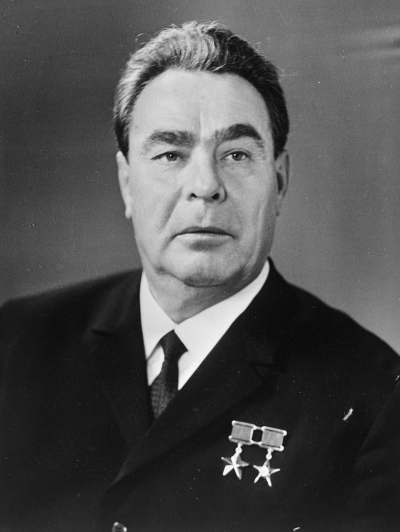Alexei Nikolayevich Kosygin (Russian: , IPA: [lksej nkla(j)vt ksn]; 21 February [O.S. 8 February] 1904 18 December 1980) was a Soviet statesman during the Cold War. He served as the Premier of the Soviet Union from 1964 to 1980 and was one of the most influential Soviet policymakers in the mid-1960s along with General Secretary Leonid Brezhnev.
Kosygin was born in the city of Saint Petersburg in 1904 to a Russian working-class family. He was conscripted into the labour army during the Russian Civil War, and after the Red Army's demobilization in 1921, he worked in Siberia as an industrial manager. Kosygin returned to Leningrad in the early 1930s and worked his way up the Soviet hierarchy. During the Great Patriotic War (World War II), Kosygin was a member of the State Defence Committee and was tasked with moving Soviet industry out of territories soon to be overrun by the German Army. He served as Minister of Finance for a year before becoming Minister of Light Industry (later, Minister of Light Industry and Food). Stalin removed Kosygin from the Politburo one year before his own death in 1953, intentionally weakening Kosygin's position within the Soviet hierarchy.
Stalin died in 1953, and on 20 March 1959, Kosygin was appointed to the position of chairman of the State Planning Committee (Gosplan), a post he would hold for little more than a year. Kosygin next became First Deputy chairman of the Council of Ministers. When Nikita Khrushchev was removed from power in 1964, Kosygin and Leonid Brezhnev succeeded him as Premier and First Secretary, respectively. Thereafter, Kosygin formed a troika alongside Brezhnev and Nikolai Podgorny, the Chairman of the Presidium of the Supreme Soviet, that governed the Soviet Union in Khrushchev's place.
During the early years of the post-Khrushchev troika, Kosygin initially emerged as the most influential figure in Soviet policymaking. In addition to managing the Soviet Union's economy, he assumed a preeminent role in its foreign policy by leading arms control talks with the US and overseeing relations with other communist countries. However, the onset of the Prague Spring in 1968 sparked a severe backlash against his policies, enabling Brezhnev to eclipse him as the dominant force in the Politburo. While he and Brezhnev disliked one another, he remained in office until being forced to retire on 23 October 1980, due to bad health. He died two months later on 18 December 1980.
Leonid Ilyich Brezhnev (19 December 1906 – 10 November 1982) was a Soviet politician who led the Soviet Union as General Secretary of the governing Communist Party (1964–1982) and as Chairman of the Presidium of the Supreme Soviet (1960–1964, 1977–1982). His 18-year term as general secretary was second only to Joseph Stalin's in duration. Brezhnev's tenure as General Secretary remains debated by historians; while his rule was characterised by political stability and significant foreign policy successes, it was also marked by corruption, inefficiency, economic stagnation, and rapidly growing technological gaps with the West.
Brezhnev was born to a working-class family in Kamenskoye (now Kamianske, Ukraine) within the Yekaterinoslav Governorate of the Russian Empire. After the results of the October Revolution were finalized with the creation of the Soviet Union, Brezhnev joined the Communist party's youth league in 1923 before becoming an official party member in 1929. When Nazi Germany invaded the Soviet Union in June 1941, he joined the Red Army as a commissar and rose rapidly through the ranks to become a major general during World War II. Following the war's end, Brezhnev was promoted to the party's Central Committee in 1952 and rose to become a full member of the Politburo by 1957. In 1964, he amassed enough power to replace Nikita Khrushchev as First Secretary of the CPSU, the most powerful position in the country.
During his tenure, Brezhnev's conservative, pragmatic approach to governance significantly improved the Soviet Union's international standing while stabilizing the position of its ruling party at home. Whereas Khrushchev often enacted policies without consulting the rest of the Politburo, Brezhnev was careful to minimize dissent among the party leadership by reaching decisions through consensus. Additionally, while pushing for détente between the two Cold War superpowers, he achieved nuclear parity with the United States and strengthened the Soviet Union's dominion over Central and Eastern Europe. Furthermore, the massive arms buildup and widespread military interventionism under Brezhnev's leadership substantially expanded the Soviet Union's influence abroad (particularly in the Middle East and Africa), although these endeavors would prove to be costly and would drag on the Soviet economy in the later years.
Conversely, Brezhnev's disregard for political reform ushered in an era of societal decline known as the Brezhnev Stagnation. In addition to pervasive corruption and falling economic growth, this period was characterized by an increasing technological gap between the Soviet Union and the United States. Upon coming to power in 1985, Mikhail Gorbachev denounced Brezhnev's government for its inefficiency and inflexibility before implementing policies to liberalise the Soviet Union.
After 1975, Brezhnev's health rapidly deteriorated and he increasingly withdrew from international affairs, while keeping his hold on power. He died on 10 November 1982 and was succeeded as general secretary by Yuri Andropov.

 English
English  español
español  français
français  português
português  русский
русский  العربية
العربية  简体中文
简体中文 
